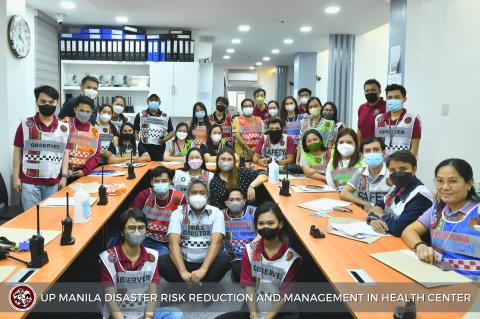Date: February 9, 2023 (9:00 AM - 12:00 NN - First Batch and 1:00 PM - 4:00 PM - Second Batch)
Venue: UP Manila Disaster Risk Reduction and Management Health Center
Authors:
Ma. Janelle D.A Gabion and Jeah May O. Badeo, March 2023
Human Resource Development Office
As a result of the Training Needs Assessment that the Human Resource Development Office (HRDO) conducted last year, almost half of the UP Manila employees who participated in the survey rated Safety Training and Emergency Response as a greatly needed training program. With this, the HRDO designed a safety and emergency response training intended for all UP Manila employees to ensure emergency preparedness on what to do and when to act in emergency situations, and for protective security and life safety protocol. Additionally, trained employees can act quickly and effectively in an emergency to mitigate the situation and save lives.
The HRDO, in collaboration with the UP Manila Disaster Risk Reduction and Management (UPM-DRRM), conducted a 3-hour safety and emergency response training in two batches last February 9, 2023. The training was held face-to-face at the UPM-DRRM Health Center, where 24 and 21 employees participated in the first and second batches, respectively.
The training started with a 1-hour lecture from the resource speaker, Dr. Carlos Primero D. Gundran, MScDM, FPCEM and the current Chair of the UPM DRRM Subcommittee. Dr. Gundran discussed the Disaster Risk Reduction and Management (DRRM) manual currently in place at UP Manila. The discussion started with the DRRM Legal Bases, its current Organizational Structure, and the Process Model for UPM DRRM Planning. The highlight of the lecture was the Incident Command System of UP Manila and the different principles governing safety responses and codes for various critical situations and hazards. The lecture focused on this matter as in times of calamities and disasters, timely decisions and prompt response by the Emergency Response Teams (ERTs) can save several lives and lessen the number of injured employees among UP Manila constituents. Additionally, the UP Manila Emergency Code Nomenclature and Incident Management Team (IMT) Color Coding were emphasized in order to facilitate better coordination among ERT personnel.
The 1-hour lecture of Dr. Gundran was followed by a 2-hour simulation session where the participants experienced implementing measures to prevent and mitigate fire incident emergencies. The participants were grouped according to the following IMT Members: Incident Commander, Command Staff (Public Information Officer, Liaison Officer, and Safety Officer), Operations Section (Operations Section, Planning Section, Logistics Section, and Finance/Administrative Section), Fire Fighting Team, Evacuation Team, Search and Rescue (SAR) Team, Medical/First Aid Team, Communications Team. The DRRM facilitators facilitated the simulation session by giving different scenarios to the participants so they could develop and refine their abilities during fire-related emergencies. The simulation experience also aimed to help individual participants and teams become more familiar with the challenges and complexities of different scenarios during a fire emergency and better understand how to work together to address them.
The last part of the training was a debriefing session headed by Dr. Gundran and the DRRM facilitators. The debriefing session allowed the participants to reflect on what went accordingly and the challenges they experienced during the simulation. Representatives from all the specified IMT members shared their learning and insights after the simulation, which included the importance of effective communication among all the team members, proper delegation of tasks, and working together to ensure everyone’s safety if an actual fire occurs.
Some key takeaways mentioned by the participants after the training session were:
“The Safety and Emergency Response training helps us prepare for potential emergencies and teaches us how to respond in a safe and effective manner. This preparedness can help reduce the severity of an incident and prevent further harm.”
“Aside from teamwork, communication [clear messages and feedback] is one of the most crucial parts of ICS. It is feasible to master foresight and anticipate possible outcomes of events based on previous disaster-handling experiences. Thus, repeated simulations should be encouraged (as evidenced by Kolb's Experiential Learning Cycle).”
“It is a great learning experience/simulation exercise putting us in a "real-life" situation where you need to be equipped with presence of mind, wit, and wisdom, esp in dealing with abrupt decision-making.”
